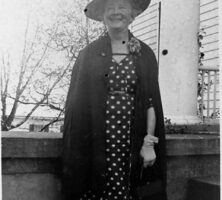Helen Dortch Longstreet, the second wife of General James Longstreet, is remembered for her unflagging work as a Confederate memorialist, Progressive reformer, and local librarian and postmistress.
Born in Carnesville on April 20, 1863, Longstreet was the daughter of Mary Pulliam and James Speed Dortch. She was educated at Brenau College (later Brenau University) in Gainesville and the Notre Dame Convent in Baltimore, Maryland. While at Brenau she met General James Longstreet, the controversial Confederate officer and father of her roommate. She later described that first encounter with Longstreet in an unpublished essay, “Wooed to the Warrior’s Tent,” held in the Helen Dortch Longstreet Papers at the Atlanta History Center. The couple married on September 8, 1897. Helen Dortch was thirty-four and the general was seventy-six. General Longstreet died six years later on January 2, 1904. The couple had no children.

Helen Longstreet served as assistant state librarian from 1894 until her marriage in 1897. After her husband’s death in 1904, she was appointed postmistress of Gainesville, a position she held until 1913. During the Progressive Era, Longstreet became quite active in local and national politics. She served as a delegate to the Progressive Party Convention in 1912 and backed Theodore Roosevelt’s presidential campaign. From 1911 to 1913 she attempted to block the Georgia Power Company from building a power dam at Tallulah Falls, in Rabun County. She published widely in newspapers and magazines and lectured extensively throughout the country advocating Progressive reform. She took her political battle to the Virgin Islands, where she campaigned to improve economic and social conditions on the island as well as to clean up an allegedly corrupt political system.
In addition to her progressive political activism, Longstreet spent considerable energy trying to resuscitate her husband’s wartime reputation. For decades many of General Longstreet’s fellow Confederate officers had accused him of disobeying General Robert E. Lee’s orders at the Battle of Gettysburg in July 1863 and thereby forsaking the Confederate cause. In 1904 Helen Longstreet privately published Lee and Longstreet at High Tide, in which she argued that because of the scurrilous comments made by petty men, “the South was seditiously taught to believe that the Federal Victory was wholly the fortuitous outcome of the culpable disobedience of General Longstreet.” She noted that her husband’s detractors began their campaign to vilify Longstreet after the death of Robert E. Lee in 1870. Lee, she felt sure, would have defended her husband against these unwarranted attacks had he been alive. Her book appeared one year after one of her husband’s severest critics, John B. Gordon, had published his memoirs, Reminiscences of the Civil War, in which he renewed his attack against General Longstreet. Gordon, however, died in early 1904, thereby ensuring that Longstreet had the “final” word on the controversy.

Throughout the remainder of her life, she continued to defend her husband’s military career both in print and on the lecture circuit. She also organized the Longstreet Memorial Association and the Longstreet Memorial Exhibit at the New York World’s Fair in 1939 and at the Golden Gate Exposition in San Francisco, California, in 1940.
In 1957 Longstreet was admitted to the Central State Hospital in Milledgeville for mental illness. She remained there until her death on May 3, 1962. She is buried in West View Cemetery in Atlanta.
In 2004 Longstreet was inducted into Georgia Women of Achievement.








